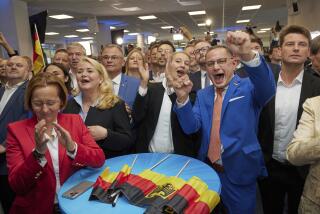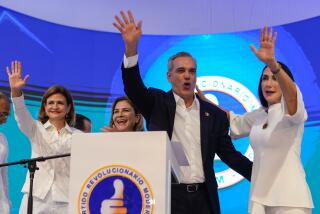Croatians Go to Polls to Elect Tudjman Successor
ZAGREB, Croatia — Voters are hoping to complete Croatia’s quiet revolution today with the choice of a new president from three front-runners with one promise in common: Whoever wins must surrender much of his power.
The election to replace Franjo Tudjman, who died of cancer Dec. 10, comes three weeks after voters threw his Croatian Democratic Union government out of power in a stunning rejection of old-style nationalism and authoritarian rule.
Opinion polls published over the weekend showed a centrist, former Yugoslav federation President Stipe Mesic, in the lead, with onetime anti-Communist dissident Drazen Budisa running second and Mate Granic, Tudjman’s foreign minister, in third place.
None of the nine candidates in the race is likely to win the more than 50% of the votes required for outright victory, the polls suggested. In that case, the top two candidates would compete in a runoff Feb. 7.
Still, after the dramatic victory in parliamentary elections Jan. 3 by a center-left coalition led by Prime Minister-designate Ivica Racan, today’s vote is an anticlimax.
During the presidential campaign, all three front-runners agreed that Croatia can no longer afford to have an all-powerful president like Tudjman, and Racan is determined to shift more authority to the prime minister’s office and parliament.
In the dead of a bitter Balkan winter, it’s a Croatian spring. Yet analysts such as Nenad Popovic warn that the current surge of optimism may be short-lived once a new government gets down to the painful job of dismantling Tudjman’s legacy.
After decades under Yugoslav dictator Josip Broz Tito, and then almost 10 years more under Tudjman’s hard-line nationalist rule after Croatia’s bloody split from the Yugoslav federation in 1991, Croatians are tasting real democracy--and the responsibilities that go with it--for the first time.
Once they have to face the tougher challenges that accompany more freedom, such as government cutbacks, job losses and growing gaps in the social safety net, voters may quickly turn nostalgic for Tudjman and his party, Popovic said Sunday.
“Of course they now want liberation. Of course they have had enough of the regime, and of course they want economic prosperity, and so on,” said Popovic, who runs a small Zagreb publishing house. “But the switch is too extreme to be convincing.”
Protesters are likely to be in the streets of Zagreb, the capital, as soon as real spring arrives and the snow melts, added Silva Meznaric, a sociologist at the Institute for Migration and Ethnic Studies research center here.
Croatian voters surprised even the optimists with a 79% turnout that humiliated the ruling party in the parliamentary elections, but no one has offered a vision to replace the nationalism that Tudjman used to unite Croatians, Meznaric said.
“It’s a basic law of all political systems,” she said. “It’s easy to change policies, but it’s very hard to change systems--which means the transition from populism to individual, responsible action.”
Rampant corruption and economic mismanagement under Tudjman, made worse by international isolation, left Croatia with a 20% unemployment rate. In addition, the economy declined by 1.5% in 1999, though most economists predict it will rebound this year.
The U.S. and European Union have promised to provide more economic aid, and encourage more investment, if Croatia’s new government cooperates in the investigation of Balkan war crimes and the resettlement of several hundred thousand Serbian refugees, for example.
But analysts warn that if Croatia’s new leaders move too quickly to please the West, they will risk provoking a backlash at home--especially if the economic payoff doesn’t reach the most conservative sections of society, such as peasant farmers.
Meznaric said that foreign investment is likely to benefit Croatia’s elite first and will not be enough, at least in the near term, to defuse the most volatile issue in Croatian society: joblessness.
However, Croatia’s economy stands a good chance of benefiting quickly from closer ties with the West because the fragmented pieces of the tourism industry and other big income earners simply need to be brought back together, Popovic said.
Under Tudjman, much of the Communist-era industrial production shifted from rusting factories to cottage industries that could now be rebuilt into a stronger economy, he maintained.
“The best example is [the Adriatic seaport of] Dubrovnik, where you have 27 huge hotel complexes but the people survived by renting out private rooms, or by building smaller hotels,” Popovic said. “If Croatia once again takes in large amounts of investment, goods, tourists or whatever, it will just normally turn back to large [and more profitable] systems.”
More to Read
Sign up for Essential California
The most important California stories and recommendations in your inbox every morning.
You may occasionally receive promotional content from the Los Angeles Times.










